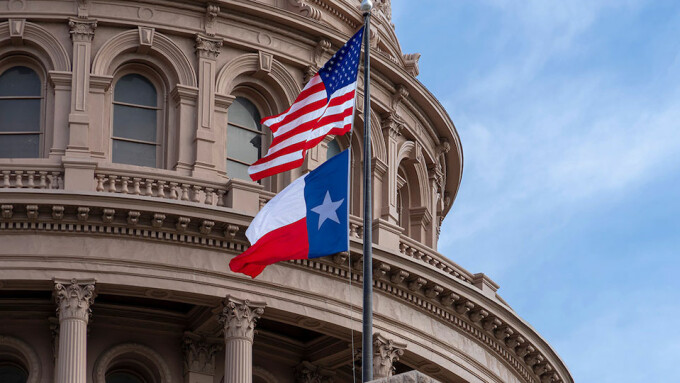AUSTIN, Texas — A three-judge panel of the 5th Circuit Court of Appeals on Wednesday heard arguments regarding the injunction against enforcement of Texas’ controversial age verification law, which mandates that adult websites post anti-porn propaganda.
Texas authorities asked the panel to lift the injunction, which was obtained on Aug. 31 by Free Speech Coalition (FSC) and other plaintiffs. HB 1181 was passed by the Texas legislature with bipartisan support in May and was scheduled to go into effect Sept. 1.
As XBIZ reported, on Sept. 21 the 5th Circuit judges issued an administrative stay of the injunction in a two-sentence ruling that offered no details or explanations.
The injunction — issued by Senior U.S. District Judge David Ezra, a Ronald Reagan appointee — blocks the Texas attorney general from enforcing the Republican-authored anti-porn age verification law while the case is litigated.
Judge Ezra “agreed with the plaintiffs that HB 1181 violates the First Amendment by forcing websites to speak Texas’ preferred messages — the health advisories that he determined were ‘somewhat deceptive’ because the state had not shown its Health and Human Services Commission had made medical findings to back the claims,” Courthouse News reported.
Judge Ezra’s reasoning, which mentioned Section 230 protections, also questioned Texas’ approach to age verification technologies, pointing out the risk of accidental disclosures, hacks and leaks.
On Wednesday, Texas Assistant AG John Ramsey claimed Judge Ezra “misunderstood how age verification works.”
Representing website operators who were among the plaintiffs who originally sued for the injunction, attorney Derek Shaffer cited Supreme Court precedent that he said “established that HB 1181 is subject to strict scrutiny,” Courthouse News Reported, adding that the strict scrutiny standard applies in cases where “laws infringe on fundamental rights and requires legislation to be narrowly tailored and the least restrictive means to further a compelling government interest.”
Shaffer also appealed to the standard that struck down the Child Online Protection Act of 1998. In that case, Courthouse News reported, the U.S. Supreme Court “specifically named content filtering as a least restrictive alternative to the anti-obscenity measures and noted that Texas lawmakers had provided no explanation as to why they had considered filtering and found it wanting.”
Content filtering, Shaffer added, “puts the responsibility where it should be, in the home and on parents.”
The three U.S. Circuit judges — George W. Bush appointee Jennifer Walker Elrod, and Ronald Reagan appointees Jerry Smith and Patrick Higginbotham — did not say when they would rule on Texas’ appeal.
FSC Executive Director Alison Boden told XBIZ, “We are optimistic that the 5th Circuit will uphold the district court judge’s well-reasoned ruling that HB 1181 is unconstitutional and should be prevented from going into effect in Texas.”







